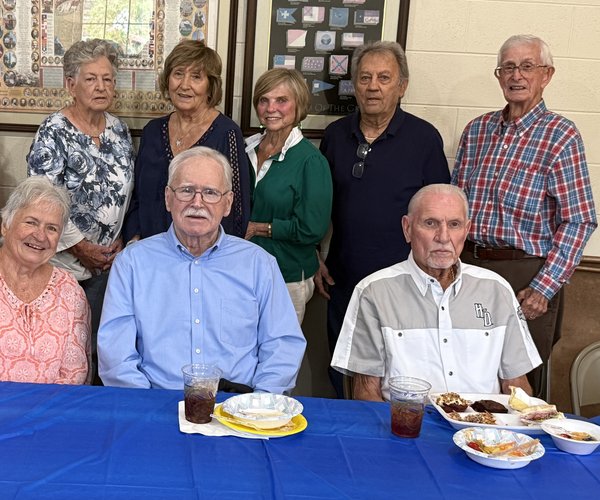Community members were given information and made comments Tuesday night concerning Springfield’s proposed spray field and draft permit.
The proposed permit will be for the land application of 600,000 gallons per day of wastewater that will be treated to reuse standards, with a future expansion to 1 million gallons a day.
The proposed land application site is 70 acres and wells on the site will be monitored.
Jane Hendricks, manager for the permitting compliance and enforcement branch in the state Environmental Protection Division’s watershed branch, said that because of the comments on the proposed permit the EPD was holding the public meeting to allow community members to ask questions.
There were questions on how the treated wastewater on the land application site would affect the nearby Ebenezer Creek.
Karen Grainey of Savannah said she enjoys spending time on Ebenezer Creek and leads nature tours there.
“I just thought I would say a few words about how important I think Ebenezer Creek is, and how important it is to do everything possible to protect it,” she said. “I go there all the time. I lead nature tours there.”
She said she has been paddling the creek for a long time.
“You don’t have to be an expert on water quality to see that the water quality there has deteriorated a lot,” she said.
“There’s been overgrowth of plants from nutrient overload. It’s very sensitive to any excess nutrients going into it.
I’ve noticed the clarity of the stream is not what it used to be. You used to be able to see much clearer through there.”
Grainey said she is just concerned about the future of the creek and that she plans to read the draft permit thoroughly prior to submitting written comments.
“I hope the right decision is made about this, and that we will do everything possible to protect the water quality in Ebenezer Creek.”
Cindy Arnsdorff, who lives next to the proposed site, also commented on her concerns about the proposed spray field.
“I appreciate that a land application system spray field may be a viable alternative for preventing the city’s wastewater treatment plant effluent from discharging into Ebenezer Creek during periods of lower flow,” she said.
“However, I urge the city to withdraw the pending permit application, or EPD to deny that application for the following five reasons.”
Arnsdorff said first the LAS is in the wrong place because it would be located next to the backwater swamp that is part of Ebenezer Creek, and any LAS should be on land that is surrounded by upland to protect streams from discharges.
She said the site is too close to Ebenezer Creek because the swamp next to the site is part of the creek. State and federal law protect the water from “point source discharges.”
“Unless the city applies for and obtains an NPDES (National Pollutant Discharge Elimination System) permit, operation of the LAS will violate the law,” Arnsdorff said.
She said whenever the wind blows from certain directions, water from the spray field will go directly into the creek.
Arnsdorff said the water being discharged onto the land will make it into the creek over time.
“Second, design and operation will not adequately protect Ebenezer Creek,” she said. “Third, the location, design and operation of the LAS will result in damage to private property that my husband and I own, and that we bought in part to assure protection of the swamp that is part of Ebenezer Creek,” Arnsdorff said. “The LAS will damage private property interests. It will damage my property.”
She said it also will damage property belonging to her neighbors.
Arnsdorff said the draft permit does not contain explicit conditions to reduce adverse effects on the creek and private property.
She said the location and construction techniques should be reviewed and approved by several state agencies before or as part of the permitting process.
“Ebenezer Creek is a Georgia scenic river, and a national natural landmark due largely to the special qualities of its swamp,” Arnsdorff said. “You may also know that the system already suffers from excessive nutrient loadings and experiences low levels of dissolved oxygen. It has not met clean water standards at Long Bridge for years.”
She said the city should look for a suitable piece of upland property while land prices are depressed. There may be property available now at a cheap price that was not available when the city purchased the current site.
“At the very least, more complete modeling and soil sampling is necessary to begin to more accurately predict what application rates can be absorbed safely,” Arnsdorff said. “Including consideration of avoidance of harm to protected animals that inhabit the site.”
Chuck Tessmer of EMC Engineering said design and development for the upgrades to the treatment plan began in 2005, and the design and development for the Long Bridge Road site began in 2007.
He said originally the plans were to expand to a 1 mgd facility but have been scaled back to .6 mgd.
“EPD has approved upgrades to the existing treatment plant to produce reuse quality water,” he said. “Those facilities are being built right now.”
The permit was drafted based on a design development report, permit application and EPD’s permitting guidelines and applications, said David Bullard, EPD manager for municipal permitting.
“For the city to increase flow to 1 million gallons per day, they would have to acquire additional land or document that a sufficient reuse customer base is established to consume the increase in reuse water,” he said. “No additional effluent can be applied to the current land application site.”
Bullard said the city will have to keep records of the amount of reuse water provided to customers.
“Ground water leaving the land application site must not exceed maximum contaminate levels for drinking water,” Bullard said. “The city will be required to show progress in complying with the Coastal Georgia water and wastewater plan for managing saltwater intrusion. This includes adopting ordinances requiring all new developments to install purple pipe reuse lines, conducting reuse feasibility studies on reclaimed water for outdoor watering, and developing a water conservation, education program to reuse water, and to help establish a reuse customer base.”
Any written comment on the proposed permit must be received by the close of business on Feb. 10. EPD will respond to all comments in writing.
Comments should be mailed to:
Director, Environmental Protection Division
Department of Natural Resources
2 Martin Luther King, Jr. Drive, Suite 1152 S.E., Floyd Towers East
Atlanta, GA 30334











